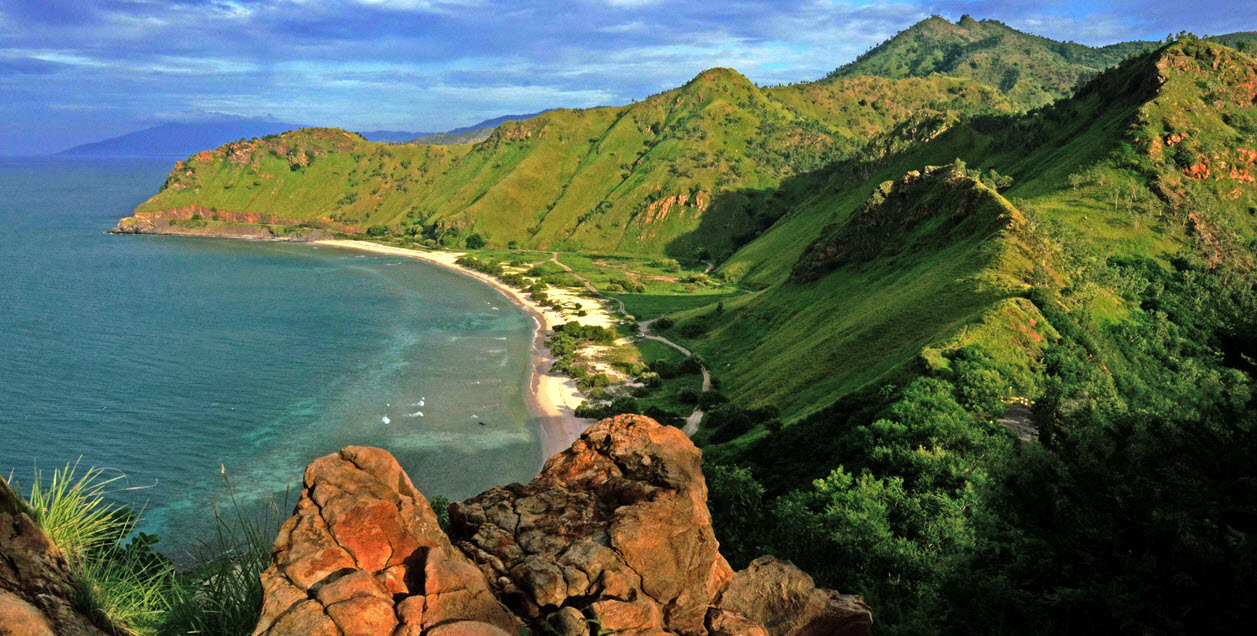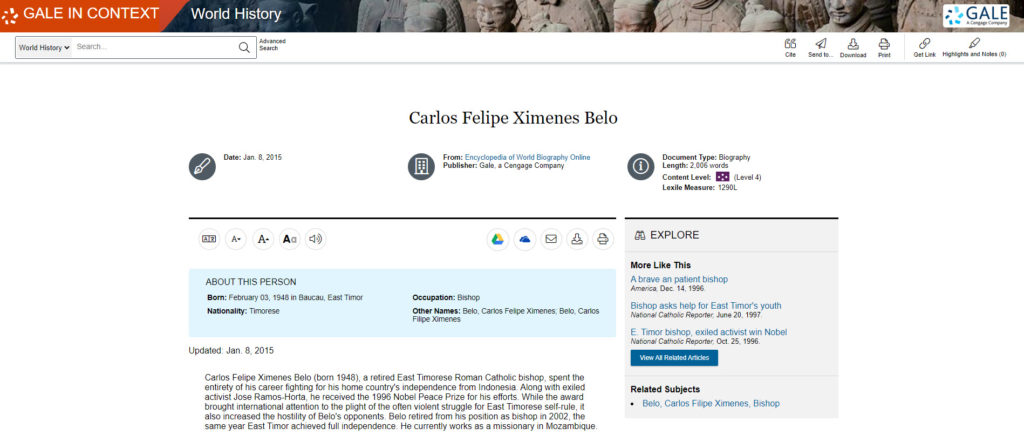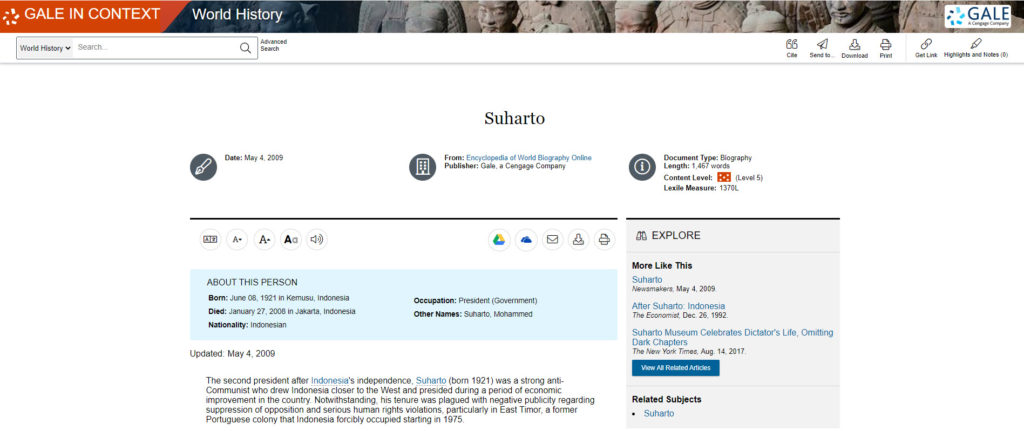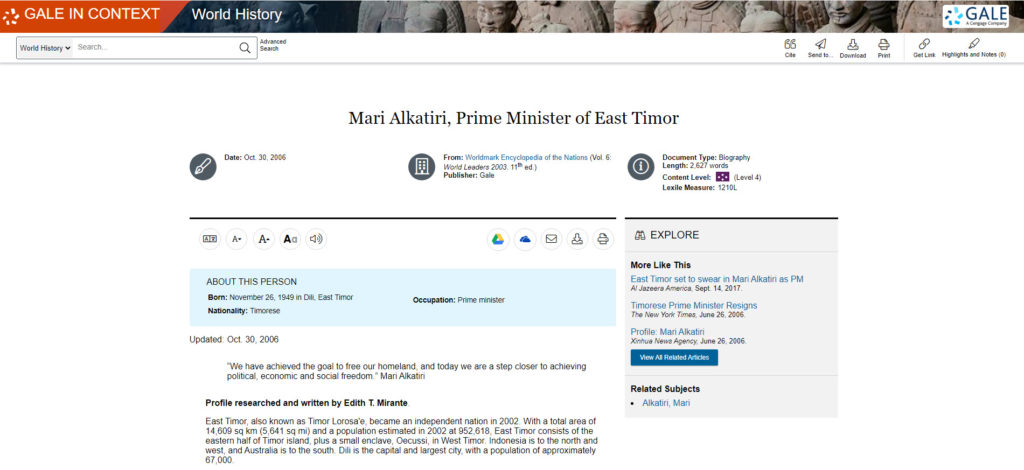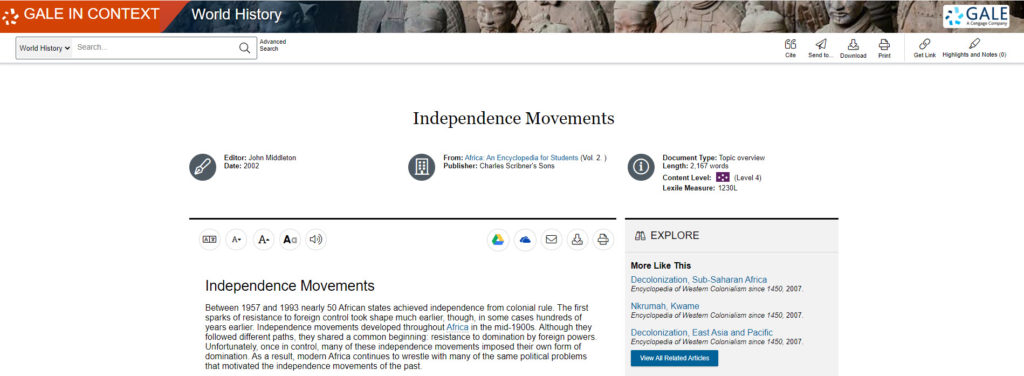| By J. Robert Parks |
Twenty years ago this week, on May 20, 2002, East Timor, also known as Timor-Leste, became the first newly independent nation of the twenty-first century. Gale In Context: World History includes coverage of this milestone and independence movements around the world.
Roughly the size of the state of Connecticut, East Timor lies on the eastern half of the island of Timor. This was East Timor’s second independence, as it briefly gained that status on November 28, 1975, before its much larger neighbor, Indonesia, invaded nine days later.
East Timor had been a colony of Portugal since the sixteenth century, except for a brief period when it was controlled by Japan during World War II. Because of its colonial heritage, the majority of East Timorese are Catholic, whereas the majority of Indonesians are Muslim. This and other cultural differences contributed to East Timorese pro-independence sentiments.
Indonesia’s invasion in 1975 was part of the Cold War. It was allied with the West, and East Timor’s new government was ruled by a Marxist party that was likely to ally with the Soviet Union. Indonesia invaded East Timor immediately after a visit from U.S. President Gerald Ford and Secretary of State Henry Kissinger, and it is widely believed that the United States gave Indonesia sanction to invade.
Indonesia ruled East Timor for almost 25 years, and conflict between the Indonesian military and pro-independence guerilla organizations was often devastating. It is estimated that 40 percent of the population died between 1975 and 1980 from war-related famine. For years, the United Nations attempted to negotiate peace between the two sides, and two East Timorese, José Ramos-Horta and Bishop Carlos Filipe Ximenes Belo, were awarded the Nobel Peace Prize in 1996 for their efforts toward peace.
The resignation of longtime Indonesian leader Suharto in 1998 opened the way for a referendum in East Timor on August 30, 1999. A massive 98 percent of the country voted, and a majority, 78.5 percent, voted for independence. Despite that overwhelming vote, pro-Indonesian militias immediately sought to upend the result with widespread violence, and many observers believe the militias were backed by the Indonesian military.
Two months later, however, another change in Indonesia’s political leadership finally led to Indonesia recognizing the referendum and agreeing to allow East Timor to become an independent country. Indonesia withdrew its military forces and gave control of the country to the United Nations. Two-and-a-half years later, East Timor became the first new country of the twenty-first century.
The years following independence weren’t easy for the new nation. Much of its infrastructure had been destroyed in decades of fighting, and its economy was in shambles. Then in 2006, tens of thousands of people fled the country because of a rise in violence and political unrest, which forced the resignation of East Timor’s first prime minister, Mari Alkatiri. In December 2008, a confidential UN memo argued that UN troops shouldn’t be withdrawn, as the country’s government could be on the verge of collapse.
Nonetheless, the East Timor government started assuming more control of its own security starting in 2009, and the UN’s peacekeeping mission in the country officially ended in 2012. In the last decade, the government has instituted policies to root out corruption and embarked on a program to build a modern transportation network. In an encouraging sign of stability, there have been multiple peaceful elections with transfers of power, such as last month, and East Timor has good relations in the 2020s with all its neighbors, including Indonesia. The country is still poor, however―especially compared to many of its neighbors in Southeast Asia. In addition, the government’s public finances are largely reliant on oil, so any fluctuation in the commodity’s price has an outsize impact on the country.
Twenty years after independence, despite significant challenges, East Timor has taken its place in the world community. It joins nations, including several in Africa, that successfully gained independence within the last half-century.
About the Author
J. Robert Parks is a former professor and frequent contributor to Gale InContext: U.S. History and Gale InContext: World History who enjoys thinking about how our understanding of history affects and reflects contemporary culture.

